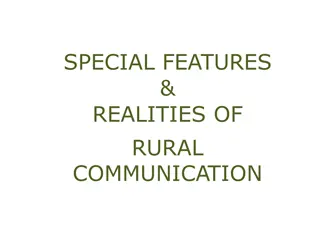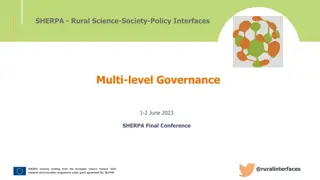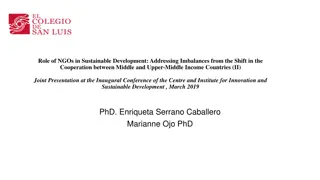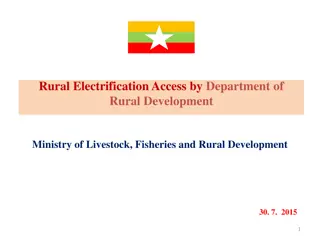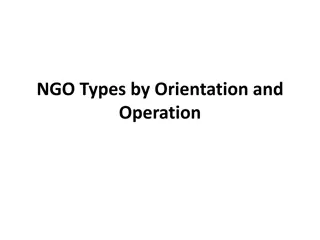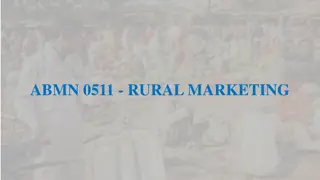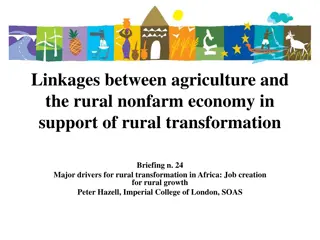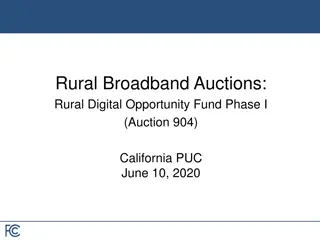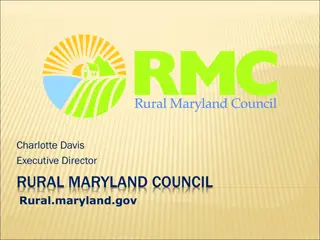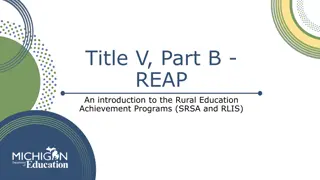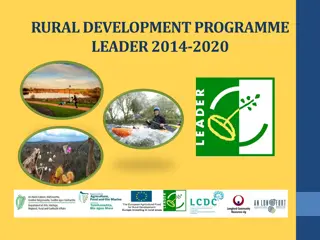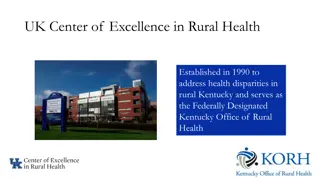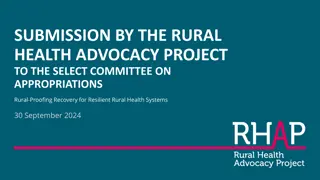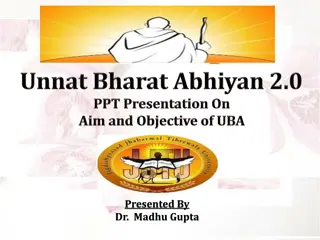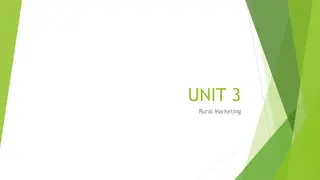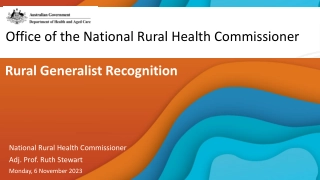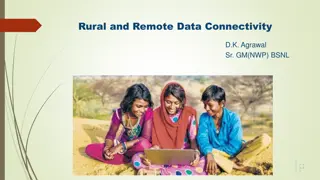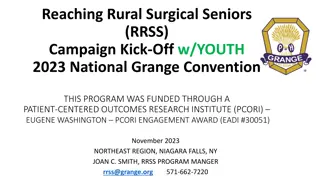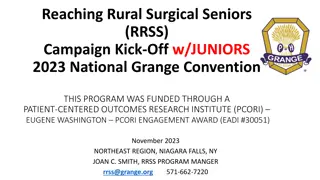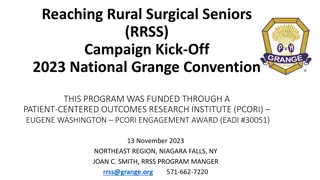Overview of NGOs Role in Rural Development
NGOs play a crucial role in rural development by engaging in activities such as income generation, health services, agriculture, vocational education, and more. Prominent organizations like BRAC work towards poverty alleviation and improving the overall quality of life in rural areas through various programs and initiatives. Rural development focuses on enhancing the well-being and economic prosperity of people residing in less populated regions by addressing factors like literacy, employment, income distribution, and social participation.
Download Presentation

Please find below an Image/Link to download the presentation.
The content on the website is provided AS IS for your information and personal use only. It may not be sold, licensed, or shared on other websites without obtaining consent from the author. Download presentation by click this link. If you encounter any issues during the download, it is possible that the publisher has removed the file from their server.
E N D
Presentation Transcript
Lecture 15-16 The Role of NGOs in Rural Development Mohammad Faisal Akber Senior Lecturer Department of Development Studies Daffodil International University
WHAT IS NGO? A non-governmental organization (NGO) is any non- profit, voluntary citizens' group which is organized on a local, national or international level.
Rural Development Rural development is the betterment in the totality of life for rural people. It is the process of improving the quality of life and economic well- being of people living in relatively isolated and sparsely populated areas. Its actions are mainly aimed to the social and economic development of the rural areas. Indicators of Rural Development Changes in agricultural productivity. Changes in rural employment, unemployment and under employment Changes in the income of different income groups Changes in the distribution of power, influence and participation. Changes in literacy, schooling, literacy rate and life expectancy Changes in values, believes and attitudes of members of state agencies as well as the rural policymaking.
NGOs Role NGO cover a wide range of rural development activities including: development of income and employment, health and sanitation, agriculture and rural craft, vocational education, relief and rehabilitation, family planning, mother and childcare. Prominent NGOs are: The Bangladesh Rural Advancement Committee (BRAC), Grameen Bank, Proshika, Manobik Unnayan Kendra, ASA, KARITAS, Proshika, Bureau Bangladesh, Rangpur-Dinajpur Rural Service etc. 4
BRAC BRAC is the largest non-governmental development organization in the world. BRAC start their journey in 1972 and has introduced itself as a pioneer in recognizing and tackling the many different realities of poverty. Their vision is of just, enlightened, healthy and democratic societies free from hunger, poverty, environmental degradation and all forms of exploitation based on age, sex, religion and ethnicity.
What BRAC Do? Microfinance Dabi - Poverty alleviation for poor landless women Unnoti - Microenterprise development for marginal farmers Progoti - Small enterprise development for businesses Program Support Enterprise -Aarong -Dairy and Food Project -Vegetable Export -Nurseries -Poultry Farms & Disease Diagnosis Lab -Broiler Production & Marketing -Seed Enterprise -Fisheries Enterprise -Feed Mills
Education Health Program -Pre-Primary School -Primary School -Children with Special Needs(CSN) -Education for Indigenous Children -Community and Formal School -Partnership with Mainstream Primary Schools -Secondary School -Continuing Education Program(CE) -Adolescent Development Program -Essential Health Care -EHC-STUP -WASH -MNCH-Rural -Manoshi-MNCH Urban -Tuberculosis Control -Malaria Control -HIV/AIDS -Shushasthya -BRAC Limb and Brace Centres -Pilot Initiatives
Social Development Human Rights & Legal Services -Human Rights and Legal Education -Capacity Sheboks/shebikas -Local Community Leaders Workshop -Human Implementation Committees -Legal Assistance Legal Aid Clinics -Human Rights Violation Cases -Polli Shomaj-ward level federations Building of -Union Shomaj- union level federation -Capacity Development of Local Government Rights and -Popular Theatre -Human Rights Violation Issues
Agriculture -Support Programs and business -Poultry and Livestock Program -Support Enterprise for Livestock and Poultry farming -Support Enterprises for Agriculture -Fisheries Program -Support Enterprise for Fisheries -Social Forestry Program -Support Enterprises Forestry -Sericulture for Social
Caritas Bangladesh Caritas Bangladesh works in integrated development, disaster management, and human resource development. They start their journey in 1967 as Caritas East Pakistan. In 1976 they were re-introduced their name as Caritas. Caritas Bangladesh is implementing over ongoing projects relating to these six goals/sectors: Improvement of the Quality of Life of the Extremely Poor and of Vulnerable Communities. Promote Education Rights and Inclusive Quality Education. Improve Health Education, Care and Public Health Services. Strengthen Disaster Response and Community Resilience. Strengthen Ecological Sustainability. Improvement of the Living Standards of Indigenous Peoples.
Proshika Established in 1976 Proshika was founded by social workers trained in BRAC who decided to concentrate mainly on human development training. The rural development activities of PROSHIKA can be grouped into three broad categories : Building self-awareness confidence Promotion of income Development of education and
ASA Established in 1978. Rural development programs taken by ASA Loan Savings Insurance Health awareness Primary education Higher education Partnership building among rural people
The Contribution of NGOs in Social Change in Bangladesh, Somalia, Nigeria : Microfinance In countries like Bangladesh, Somalia, and Nigeria, women are disproportionately disadvantaged. Women constitute the overwhelming majority of the microfinance beneficiaries. Microfinance helps women acquire assets of their own and exercise power in household decision making. Microfinance programs taken by NGOs promote investment in human capital and raise awareness of reproductive health issues among poor families. Grameen Bank, BRAC, ASA in Bangladesh; Salaam Financial Services, Kabaa Microfinance Institution Somaliland provide short loans to poor women. (K-MFI) in
Microfinance Empowerment Women Targeting Women
The Contribution of NGOs in Social Change in Bangladesh, Somalia, Nigeria : Education BRAC sNon-Formal Primary Education Program is an initiative for the rural areas of Bangladesh to provide basic education to the large numbers of children who were not being reached through government efforts. In comparison with the teachers in the formal education system, BRAC teachers have smaller classes (30 students only), teach fewer subjects, address fewer objectives and provide an estimated 500 additional hours per year of engaged instructional time. Similarly Association for Social Advancement-ASA in Bangladesh, Plan International, Teach for India these are working for ensuring basic education for drop out students.
The Contribution of NGOs in Social Change in Bangladesh, Somalia, Nigeria : Health The Lancet documented in 2013 that Bangladesh achieved a great success in health especially in the improvements in the survival of infants and children under 5 years of age, life expectancy, immunization coverage and tuberculosis. BRAC s WASH (Water, Sanitation, and Hygiene) program is another hallmark initiative in health sector. Under this program extreme poor people get financial cooperation in construction of sanitary latrine and also obtain awareness about sanitation system. African Childhood Care Network in Nigeria, Society for Telemedicine and E-Health in Nigeria, Oxfam International in Somalia are working for ensuring health facilities.
The Contribution of NGOs in Social Change in Bangladesh, Somalia, Nigeria : Women Empowerment NGOs, as the development partners of government, are working towards women empowerment and implementing a series of development intervention for eradicating gender discrimination. Following the continuation of initiatives, NGOs have arranged many income generating activities like apiculture, silk production, embroidery, fishnet matching, poultry and livestock to increase the socio economic condition of women. In 2012, CARE Bangladesh provided a list of 81 NGOs including BRAC, CARE-Bangladesh, Hitaishi Bangladesh, Manusher Jonno, Mohila Porishad, Oxfam, have been launching project on issues pertaining to violence against women, either through direct services or advocacy. Action Aid Nigeria, African Girls Empowerment working for the women empowerment.
The Contribution of NGOs in Social Change in Bangladesh, Somalia, Nigeria : Raising Awareness Local Decision Making Democratization Transparency
The Contribution of NGOs in Social Change in Bangladesh, Somalia, Nigeria : Access to Government Resources Many NGOs have created the unconventional opportunity to use the khas (unused) land by introducing social forestation and group irrigations system for landless people usage. Particularly, NGOs are organizing the landless people, establishing village based nursery, assisting in social forestation and tree plantation, taking lease to khas land and dry riverbed to make use of shared fish culture. Action Aid Nigeria, Association for Grassroots Development (AGD) are working for the urban-rural peoples development.
The Contribution of NGOs in Social Change in Bangladesh, Somalia, Nigeria : Environment The major environmental problems in Bangladesh include deforestation, desertification arsenic problem and damage to the genetic and aquatic environment. The NGOs undertake various programs to contest deforestation and to improve the conditions of deforestation as well as in a forestation program, improving sanitation facilities and ensuring the supply of safe drinking water through the distribution of water-sealed latrines and tube- wells among the beneficiaries. Green Peace, BELA, World Wildlife Fund, 1% For The Planet, Friends of Earth are working for protecting the environment.
The Contribution of NGOs in Social Change in Bangladesh, Somalia, Nigeria: Relief and Rehabilitation At the time of natural disasters like flood, drought, famine, storm, contaminated diseases, the NGOs have been planning a momentous role in distributing relief and substantial help among the wounded people along with government and after disaster, and then they would also undertake different rehabilitation activities for the betterment of disaster affected people. African Refugee Foundation (AREF) in Nigeria, Islamic Relief and Mercy Corps in Somalia have been working for a long time in the crisis areas.
The Contribution of NGOs in Social Change in Bangladesh, Somalia, Nigeria: Employment Generation NGOs are playing significant role to encourage the rural poor to participate in different economic activities and to increase their income through employment generation. Some large organizations professional training for higher official and unemployed people that generate job facilities. On the other hand, they provide loans and management assistance to individuals, which create new employment opportunity. Action Aid for the Unemployed in Nigeria has been working for the unemployed people. launches very effective
The Contribution of NGOs in Social Change in Bangladesh, Somalia, Nigeria: Non-traditional Agricultural Extension and Food Security Under taking the program of agriculture and food security, BRAC works with government to ensure food security by keeping direct contribution in producing, distributing and marketing quality seeds, conducting research to develop better varieties. In 2012, under share croppers development project, total borrowers was 2, 00,000 and more than 1, 50,000 farmers got training on their agricultural works as the extension of non- traditional agriculture. Some NGOs undertake unique programs of technology involving innovative fertilizer usage and waste management. Advocacy Committee Against Hunger in Nigeria is like that.
The Contribution of NGOs in Social Change in Bangladesh, Somalia, Nigeria: Family Planning NGOs have made momentous contributions on family planning. Specifically, Bangladesh s national policies and NGOs include a highly developed outreach program that offers family planning services through a program of direct education and distribution of contraceptives in the homes and motivational activities as well as reproductive health care and surgical services of rural women and urban slums in Bangladesh.


